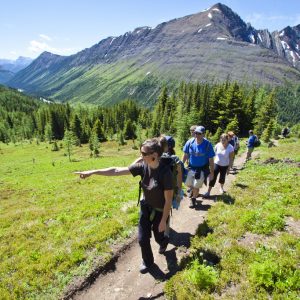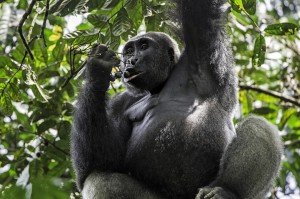Award-winning tour operator Austin Adventures, the multisport tour company setting adventure travel standards in The Americas, Europe, Africa, the Caribbean and Antarctica, in 2014 will guide clients into the Congo River Basin tracking one of the world’s most elusive animals, the Western Lowland Gorilla.
The per person double rate for the seven-day/six-night trip is $8,598; a single supplement is $3,980. There are weekly departures year round for between two and 10 clients. See here
“Few companies offer the Republic of Congo on their African safari itineraries. This region is only regaining attention due to calming of political unrest in neighboring countries of the Democratic Republic of Congo and Gabon, and the building of new safari camps and infrastructure,” notes Dan Austin, Director, Austin Adventures.
The trip begins and ends in Brazzaville, capital of the Republic of the Congo. Guests lodge on night one at Mikhael’s Hotel in this French-influenced town in central Africa, before departing by private charter and 4x4 vehicles to Lango Camp, one of two thatch-roofed, luxuriously appointed camps enjoyed on this itinerary. Lango and Ngaga are sensitively constructed facilities that blend into the remote forest environment.
Lango Camp is in theCongoRiver Basinon the edge of the savannah inOdzala-KokouaNational Park, home to the world’s second (after the Amazon) largest tropical rainforest. The park is pivotal for Western Lowland Gorilla conservation inCentral Africa. This region holds the distinction for African forest elephants and is renowned as the richest forest block in centralAfricafor primates, with 11 diurnal species recorded and more than 100 mammal species.
This is home while spending two full days tracking with expert guides two family groups of this smallest subspecies of gorilla, watching quietly from a forest perch as these elusive creatures rest and forage, often with their youngsters in tow. Their habitat is trees but they are often on the ground feeding on fruits and digging. This primate is considered man’s closest relatives in the natural world.
Ngaga Camp, in the heart of a marantacea (a tuberous plant) forest, offers more than a single species focus and is an experience encompassing forest elephant, buffalo and a range of other species seldom seen elsewhere. There are boating trips by motorized pirogues. Here guests enjoy the expertise of seasoned trackers and naturalists who provide information on research in the area, conservation concern for the species, their biology and ecology.
Animals that may be seen on both day and night excursions include such rare and endangered species as chimpanzees, mountain gorillas, bonobos (pygmy monkey), okapi, white rhinos and duikers that are antelopes the size of rabbits. Other species include red river hogs, buffalo and bongo, spotted hyena, golden cat, water chevrotain and forest elephant.
Covering an area of almost 342,000 square kilometers, Republic of theCongois slightly smaller thanMontana. The population is a mere four million people, of whom 70 percent live inBrazzavilleand Pointe-Noire, the major port on the country’s narrow coastal strip on theAtlantic Ocean. The rest of the country is sparsely populated and largely pristine. Bordering countries areAngola,Cameroon,Central African Republic,Democratic Republic of the CongoandGabon. This little-known former French colony was spared the conflict of neighboringDemocratic Republic of the Congo, and not having shared neighboringGabon's recent limelight, tourism to theCongois at a fledgling stage with an aura of exploration and discovery enhancing every journey into its interior.
Austin Adventures’ deep commitment to Africa includes Dan Austin’s founding of the 501c3 non-profit initiative Wheels of Change that donates used bikes, parts and tools to various rural communities throughout Africa bringing mobility and economic development to those who need it the most.

